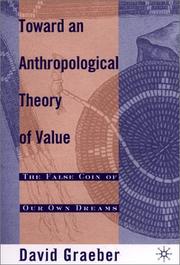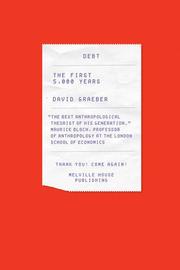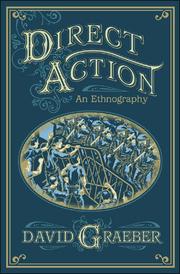| Listing 1 - 10 of 22 | << page >> |
Sort by
|

ISBN: 9780312240455 0312240457 0312240449 9780312240448 9780312299064 Year: 2001 Publisher: New York: Palgrave,
Abstract | Keywords | Export | Availability | Bookmark
 Loading...
Loading...Choose an application
- Reference Manager
- EndNote
- RefWorks (Direct export to RefWorks)
Now a widely cited classic, this innovative book is the first comprehensive synthesis of economic, political, and cultural theories of value. David Graeber reexamines a century of anthropological thought about value and exchange, in large measure to find a way out of ongoing quandaries in current social theory, which have become critical at the present moment of ideological collapse in the face of Neoliberalism. Rooted in an engaged, dynamic realism, Graeber argues that projects of cultural comparison are in a sense necessarily revolutionary projects: He attempts to synthesize the best insights of Karl Marx and Marcel Mauss, arguing that these figures represent two extreme, but ultimately complementary, possibilities in the shape such a project might take. Graeber breathes new life into the classic anthropological texts on exchange, value, and economy. He rethinks the cases of Iroquois wampum, Pacific kula exchanges, and the Kwakiutl potlatch within the flow of world historical processes, and recasts value as a model of human meaning-making, which far exceeds rationalist/reductive economist paradigms.
Values. --- Anthropology --- Social values. --- Ceremonial exchange. --- Valeurs (Philosophie) --- Anthropologie --- Valeurs sociales --- Echange cérémoniel --- Philosophy. --- Philosophie --- Values --- Social Values --- Ceremonial exchange --- Philosophy --- #SBIB:39A3 --- Antropologie: geschiedenis, theorie, wetenschap (incl. grondleggers van de antropologie als wetenschap) --- Echange cérémoniel --- Social values --- Axiology --- Worth --- Aesthetics --- Knowledge, Theory of --- Metaphysics --- Psychology --- Ethics --- Gift exchange --- Exchange --- Rites and ceremonies --- Anthropology - Philosophy --- Sociology --- Economic sociology

ISBN: 9780972819640 0972819649 Year: 2004 Publisher: Chicago : Prickly Paradigm Press : Distributed by University of Chicago Press,
Abstract | Keywords | Export | Availability | Bookmark
 Loading...
Loading...Choose an application
- Reference Manager
- EndNote
- RefWorks (Direct export to RefWorks)
Political anthropology --- Anarchism. --- State, The. --- Anthropologie politique --- Anarchisme --- Etat --- Philosophy. --- Philosophie --- Administration --- Commonwealth, The --- Sovereignty --- Political science --- Anarchism and anarchists --- Anarchy --- Government, Resistance to --- Libertarianism --- Nihilism --- Socialism --- Anthropology, Political --- Government, Primitive --- Ethnology --- Anthropological aspects

ISBN: 9780253219152 9780253349101 0253219159 0253349109 9786612078446 0253116996 1282078445 9780253116994 9781282078444 6612078448 Year: 2007 Publisher: Bloomington Indiana University Press
Abstract | Keywords | Export | Availability | Bookmark
 Loading...
Loading...Choose an application
- Reference Manager
- EndNote
- RefWorks (Direct export to RefWorks)
An epic account of the power of memory in Madagascar
Ethnology --- Slavery --- Betafo (Madagascar) --- History. --- Social life and customs. --- Abolition of slavery --- Antislavery --- Enslavement --- Mui tsai --- Ownership of slaves --- Servitude --- Slave keeping --- Slave system --- Slaveholding --- Thralldom --- Crimes against humanity --- Serfdom --- Slaveholders --- Slaves --- Cultural anthropology --- Ethnography --- Races of man --- Social anthropology --- Anthropology --- Human beings --- Enslaved persons

ISBN: 9781904859666 1904859666 Year: 2007 Publisher: Oakland (Calif.): AK Press,
Abstract | Keywords | Export | Availability | Bookmark
 Loading...
Loading...Choose an application
- Reference Manager
- EndNote
- RefWorks (Direct export to RefWorks)
Essays over hiërarchie, rebellie en verlangen.
Economic anthropology --- Capitalism. --- Consumption (Economics) --- Anthropologie économique --- Capitalisme --- Consommation (Economie politique) --- Capitalism --- Hierachies --- Philosophy --- Social aspects --- Anthropologie économique --- Economic anthropology - Philosophy --- Hierachies - Social aspects --- Consumption (Economics). --- Philosophy. --- Social aspects.

ISBN: 9781933633862 9781612191294 1933633867 1612191290 Year: 2012 Publisher: New York (N.Y.): Melville,
Abstract | Keywords | Export | Availability | Bookmark
 Loading...
Loading...Choose an application
- Reference Manager
- EndNote
- RefWorks (Direct export to RefWorks)
Every economics textbook says the same thing: Money was invented to replace onerous and complicated barter system--to relieve ancient people from having to haul their goods to market. The problem with this version of history? There's not a shred of evidence to support it. Here anthropologist David Graeber presents a stunning reversal of conventional wisdom. He shows that for more than 5,000 years, since the beginning of the agrarian empires, humans have used elaborate credit systems--a system that far preceeded cash or organized barter. It is in this era, Graeber shows, that we also first encounter a society divided into debtors and creditors. With the passage of time, however, virtual credit money was replaced by gold and silver coins--and the system as a whole began to decline. Interest rates spiked and the indebted became slaves. And the system perpetuated itself with tremendously violent consequences, with only the rare intervention of kings and churches keeping the system from spiraling out of control. Debt: The First 5,000 Years is a fascinating chronicle of this little known history--as well as how it has defined human history, and what it means for the credit crisis of the present day and the future of our economy.
AA / International- internationaal --- 331.162.4 --- 333.70 --- Geschiedenis van het krediet. --- Theorie en organisatie van het bankkrediet. --- Debt --- -Money --- -Financial crises --- -336.7 <09> --- 330.9 --- 332 --- Crashes, Financial --- Crises, Financial --- Financial crashes --- Financial panics --- Panics (Finance) --- Stock exchange crashes --- Stock market panics --- Currency --- Monetary question --- Money, Primitive --- Specie --- Standard of value --- Indebtedness --- 336.7 <09> Geschiedenis van het bankwezen --- Geschiedenis van het bankwezen --- History --- Crises --- Exchange --- Finance --- Value --- Banks and banking --- Coinage --- Currency question --- Gold --- Silver --- Silver question --- Wealth --- Financial crises --- Money --- Geschiedenis van het krediet --- Theorie en organisatie van het bankkrediet --- International finance --- 336.7 <09> --- History. --- Dettes --- Monnaie --- Crises financières --- Histoire --- Debt - History --- Money - History --- Financial crises - History

ISBN: 9781904859796 1904859798 Year: 2009 Publisher: Edinburgh: AK Press,
Abstract | Keywords | Export | Availability | Bookmark
 Loading...
Loading...Choose an application
- Reference Manager
- EndNote
- RefWorks (Direct export to RefWorks)
Political anthropology --- Anti-globalization movement --- Direct action --- Anthropologie politique --- Antimondialisation --- Action directe --- Summit of the Americas --- Political anthropology - America --- Anti-globalization movement - America --- Direct action - Québec (Province) - Québec --- Summit of the Americas.
Book
ISBN: 9781570272431 1570272433 Year: 2011 Publisher: London : 9781570272431,
Abstract | Keywords | Export | Availability | Bookmark
 Loading...
Loading...Choose an application
- Reference Manager
- EndNote
- RefWorks (Direct export to RefWorks)
"Capitalism as we know it appears to be coming apart. But as financial institutions stagger and crumble, there is no obvious alternative. There is good reason to believe that, in a generation or so, capitalism will no longer exist: for the simple reason that it's impossible to maintain an engine of perpetual growth forever on a finite planet. Yet faced with this prospect, the knee-jerk reaction is often to cling to what exists because they simply can't imagine an alternative that wouldn't be even more oppressive and destructive. The political imagination seems to have reached an impasse. Or has it? In this collection of essays David Graeber explores a wide-ranging set of topics including political strategy, global trade, debt, imagination, violence, aesthetics, alienation, and creativity. Written in the wake of the anti-globalization movement and the rise of the war on terror, these essays survey the political landscape for signs of hope in unexpected places"--P. [4] of cover.
Revolutions. --- Anti-globalization movement. --- Essays. --- Révolutions --- Antimondialisation --- Essais (Genre littéraire)
Book
ISBN: 2895960372 Year: 2006 Publisher: Montréal (Québec) : Lux éd. ; [Paris] : diff. DNM,
Abstract | Keywords | Export | Availability | Bookmark
 Loading...
Loading...Choose an application
- Reference Manager
- EndNote
- RefWorks (Direct export to RefWorks)
Anarchism --- Political anthropology --- Anarchisme --- Anthropologie politique
Book
ISBN: 9781846146633 1846146631 9780718194567 071819456X Year: 2012 Publisher: London : Allen Lane,
Abstract | Keywords | Export | Availability | Bookmark
 Loading...
Loading...Choose an application
- Reference Manager
- EndNote
- RefWorks (Direct export to RefWorks)
Occupy movement --- Protest movements --- Income distribution --- Equality --- History --- Public opinion. --- Occupy Wall Street (Movement) --- History.
Book
ISBN: 9782895961802 2895961808 Year: 2014 Volume: 27 Publisher: Montréal, Qc: Lux,
Abstract | Keywords | Export | Availability | Bookmark
 Loading...
Loading...Choose an application
- Reference Manager
- EndNote
- RefWorks (Direct export to RefWorks)
La servilité des élites politiques actuelles en font les laquais des plus riches et des plus puissants, de sorte que les mécanismes de nos systèmes dits démocratiques ne réussissent pas à résoudre ni même à endiguer les crises dans lesquelles nous enfonce le capitalisme. Comment, alors, adviendra le changement ? Dans cet essai, David Graeber guide le lecteur dans les rouages de la véritable démocratie pour déconstruire les idées reçues et réorienter de manière audacieuse notre compréhension de l'histoire politique. Chemin faisant, il cite des exemples qui pourraient servir de modèles pour une transformation du monde et qui ont d'ailleurs inspiré le mouvement des Indignados et Occupy Wall Street. Devant la concentration de la richesse et du pouvoir dans tous les pays occidentaux, et plus particulièrement aux Etats-Unis, Graeber soutient que seule une conception radicale de la démocratie basée sur des principes d'égalité, de la participation citoyenne massive et de recherche du consensus peut nous permettre de jeter les bases de la société juste et équitable que nous souhaitons. Il s'agirait, pour y arriver, de faire comme si nous étions déjà libres.
Mouvement des indignés --- Contestation --- Démocratie --- Histoire. --- Mouvement des indignés --- Democracy --- History --- Democracy - History
| Listing 1 - 10 of 22 | << page >> |
Sort by
|

 Search
Search Feedback
Feedback About UniCat
About UniCat  Help
Help News
News